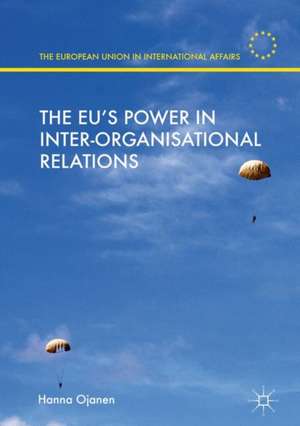The EU's Power in Inter-Organisational Relations: The European Union in International Affairs
Autor Hanna Ojanenen Limba Engleză Paperback – 22 feb 2019
| Toate formatele și edițiile | Preț | Express |
|---|---|---|
| Paperback (1) | 679.86 lei 38-44 zile | |
| Palgrave Macmillan UK – 22 feb 2019 | 679.86 lei 38-44 zile | |
| Hardback (1) | 727.48 lei 6-8 săpt. | |
| Palgrave Macmillan UK – 14 dec 2017 | 727.48 lei 6-8 săpt. |
Din seria The European Union in International Affairs
- 15%
 Preț: 695.53 lei
Preț: 695.53 lei - 15%
 Preț: 499.12 lei
Preț: 499.12 lei -
 Preț: 351.66 lei
Preț: 351.66 lei -
 Preț: 392.60 lei
Preț: 392.60 lei - 18%
 Preț: 779.08 lei
Preț: 779.08 lei - 18%
 Preț: 1005.74 lei
Preț: 1005.74 lei - 15%
 Preț: 640.59 lei
Preț: 640.59 lei - 18%
 Preț: 787.61 lei
Preț: 787.61 lei - 18%
 Preț: 783.98 lei
Preț: 783.98 lei -
 Preț: 389.70 lei
Preț: 389.70 lei - 18%
 Preț: 778.76 lei
Preț: 778.76 lei - 18%
 Preț: 725.75 lei
Preț: 725.75 lei - 15%
 Preț: 639.90 lei
Preț: 639.90 lei - 15%
 Preț: 639.90 lei
Preț: 639.90 lei -
 Preț: 389.70 lei
Preț: 389.70 lei - 18%
 Preț: 944.19 lei
Preț: 944.19 lei -
 Preț: 384.09 lei
Preț: 384.09 lei - 18%
 Preț: 781.77 lei
Preț: 781.77 lei - 15%
 Preț: 584.26 lei
Preț: 584.26 lei - 15%
 Preț: 467.79 lei
Preț: 467.79 lei - 15%
 Preț: 641.71 lei
Preț: 641.71 lei - 18%
 Preț: 898.13 lei
Preț: 898.13 lei -
 Preț: 408.66 lei
Preț: 408.66 lei - 18%
 Preț: 782.72 lei
Preț: 782.72 lei - 18%
 Preț: 784.79 lei
Preț: 784.79 lei -
 Preț: 384.09 lei
Preț: 384.09 lei -
 Preț: 390.63 lei
Preț: 390.63 lei -
 Preț: 387.75 lei
Preț: 387.75 lei -
 Preț: 382.36 lei
Preț: 382.36 lei - 15%
 Preț: 640.71 lei
Preț: 640.71 lei - 15%
 Preț: 642.36 lei
Preț: 642.36 lei
Preț: 679.86 lei
Preț vechi: 747.11 lei
-9% Nou
Puncte Express: 1020
Preț estimativ în valută:
130.09€ • 136.10$ • 108.07£
130.09€ • 136.10$ • 108.07£
Carte tipărită la comandă
Livrare economică 29 martie-04 aprilie
Preluare comenzi: 021 569.72.76
Specificații
ISBN-13: 9781349681365
ISBN-10: 1349681369
Pagini: 231
Ilustrații: IX, 231 p.
Dimensiuni: 148 x 210 mm
Greutate: 0.27 kg
Ediția:1st ed. 2018
Editura: Palgrave Macmillan UK
Colecția Palgrave Macmillan
Seria The European Union in International Affairs
Locul publicării:London, United Kingdom
ISBN-10: 1349681369
Pagini: 231
Ilustrații: IX, 231 p.
Dimensiuni: 148 x 210 mm
Greutate: 0.27 kg
Ediția:1st ed. 2018
Editura: Palgrave Macmillan UK
Colecția Palgrave Macmillan
Seria The European Union in International Affairs
Locul publicării:London, United Kingdom
Cuprins
Chapter 1 Understanding inter-organisational relations: substance and toolbox.- Chapter 2 Analysing inter-organisational relations.- Chapter 3 Analysing the power of the EU.- Chapter 4 Analysing power in inter-organisational relations.- Chapter 5 Power at work: relevance and tasks.- Chapter 6.- Power at work: relevance and hierarchies.- Chapter 7 Power at work: relevance and image.- Chapter 8 Conclusions and implications.
Notă biografică
Hanna Ojanen is Jean Monnet Professor at the University of Tampere, Finland. Previously Head of Research at the Swedish Institute of International Affairs and Programme Director of the European Union research programme at the Finnish Institute of International Affairs, she focuses on European integration, notably security and defence policy.
Textul de pe ultima copertă
This book studies inter-organisational relations from a new angle: power. Drawing on examples that highlight how the EU relates to NATO and to the UN, it shows how consequential inter-organisational relations are for the functioning and nature of the organisations, and how important it is to detect the forms of power exerted in these relations. Power, for international organisations, is above all about relevance. In an era when the legitimacy and role of international organisations is increasingly questioned, the organisations have a growing concern for ensuring their continued relevance. Subsequently, the management of relevance is a central part of inter-organisational relations and becomes visible in the way organisations handle questions about their tasks, hierarchies and image. Clear and accessible, the book will appeal both to the growing scholarly community working on inter-organisational relations and to a variety of audiences including practitioners and scholars outside the field of international relations.
Caracteristici
Outlines when the EU has power over international organisations, and what kind of power it has Contributes to our understanding of the EU as an international actor and to that of the evolution of the international system as a whole Analyses three sets of empirical cases featuring concrete interaction between the EU, NATO and the UN
